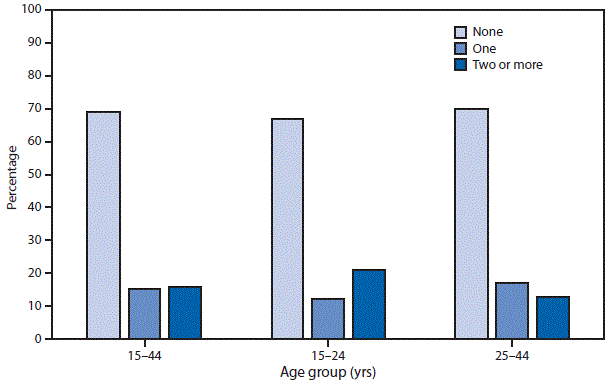QuickStats: Percentage of Women Who Missed Taking Oral Contraceptive Pills* Among Women Aged 15–44 Years Who Used Oral Contraceptive Pills and Had Sexual Intercourse, Overall and by Age and Number of Pills Missed — National Survey Of Family Growth, United States, 2013–2015†
Weekly / September 15, 2017 / 66(36);965

* Percentages are based on women who used oral contraceptive pills in the past 4 weeks and had sexual intercourse in the past 12 months, who were asked the question “Still thinking about the past 4 weeks, how many pills that you were supposed to take did you miss? Would you say you never missed a pill, missed only one pill, or missed two or more pills?”
† Estimates are based on interviews of the U.S. household population aged 15–44 years.
Among women aged 15–44 years who used oral contraceptive pills in the last 4 weeks and had sexual intercourse in the past 12 months, 69% of women reported missing no pills, 15% missed one pill, and 16% missed two or more pills. Across the two age groups (15–24 years and 25–44 years), similar percentages of women aged 15–24 years reported missing no pills (67%) compared with women aged 25–44 years (70%). Similar percentages of women aged 15–24 years reported missing one pill (12%) compared with women aged 25–44 years (17%). A higher percentage of women aged 15–24 years (21%) reported missing two or more pills compared with women aged 25–44 years (13%).
Source: National Survey of Family Growth, 2013–2015. https://www.cdc.gov/nchs/nsfg/index.htm.
Reported by: Kimberly Daniels, PhD, kdaniels1@cdc.gov, 301-458-4511; Joyce Abma, PhD.
Suggested citation for this article: QuickStats: Percentage of Women Who Missed Taking Oral Contraceptive Pills Among Women Aged 15–44 Years Who Used Oral Contraceptive Pills and Had Sexual Intercourse, Overall and by Age and Number of Pills Missed — National Survey Of Family Growth, United States, 2013–2015. MMWR Morb Mortal Wkly Rep 2017;66:965. DOI: http://dx.doi.org/10.15585/mmwr.mm6636a10.
Use of trade names and commercial sources is for identification only and does not imply endorsement by the U.S. Department of
Health and Human Services.
References to non-CDC sites on the Internet are
provided as a service to MMWR readers and do not constitute or imply
endorsement of these organizations or their programs by CDC or the U.S.
Department of Health and Human Services. CDC is not responsible for the content
of pages found at these sites. URL addresses listed in MMWR were current as of
the date of publication.
All HTML versions of MMWR articles are generated from final proofs through an automated process. This conversion might result in character translation or format errors in the HTML version. Users are referred to the electronic PDF version (https://www.cdc.gov/mmwr) and/or the original MMWR paper copy for printable versions of official text, figures, and tables.
Questions or messages regarding errors in formatting should be addressed to mmwrq@cdc.gov.
- Page last reviewed: September 14, 2017
- Page last updated: September 14, 2017
- Content source:


 ShareCompartir
ShareCompartir